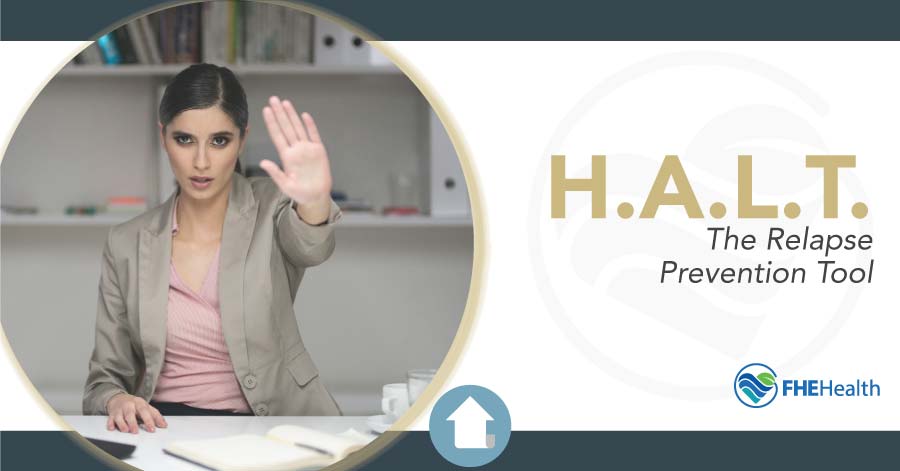
Recovery from addiction is a lifelong process, and whether you are a few months or a few years clean, are looking to return to recovery, or you’re just considering whether you could benefit from some assistance, FHE Health has simple tools that can help you avoid relapse while making healthy decisions with beneficial outcomes. One of those tools is the helpful acronym, H.A.L.T.
If you’re feeling Hungry, Angry, Lonely or Tired, these are signs that you should take a moment for some self-care and reflection, but recognizing this is not always so straightforward. In our daily travels, we can be distracted and out of touch with our most basic needs and feelings, and if you are faced with an important decision, are struggling with the prospect of relapse or things are just feeling off to you, this simple tool may be just what’s needed.
What Is H.A.L.T. and Who Can Use It?
As the acronym suggests, it is often important to stop all the noise to take a minute to yourself and assess how you’re doing. H.A.L.T. is a concept that can be applied to anyone’s life as we each have similar basic needs and reactions, and each and every one of us has our own coping strategies.
But in recovery, there is a need to be consistently taking inventory of how you feel, what you’re learning and how to work these new strategies into your everyday life. So let’s take a closer look at the components of H.A.L.T.
Hungry
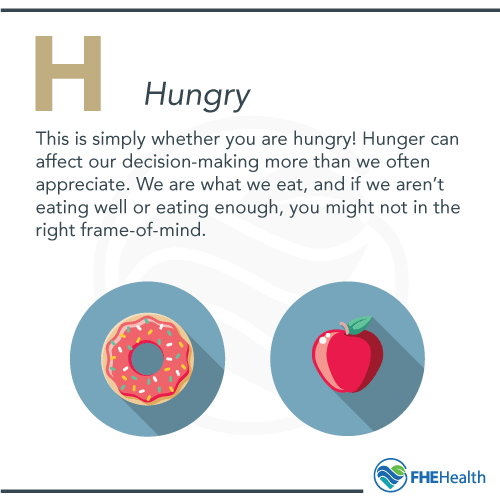 When you’ve skipped a meal, typically, your stomach lets you know. This is our body telling us that we are lacking food and should eat something. This may seem like a low priority at times, but low blood sugar and hunger pangs can be a powerful distraction from the task at hand.
When you’ve skipped a meal, typically, your stomach lets you know. This is our body telling us that we are lacking food and should eat something. This may seem like a low priority at times, but low blood sugar and hunger pangs can be a powerful distraction from the task at hand.
We also hunger for other things, things like companionship, attention, understanding and comfort. In recovery, we build a community of like-minded people so we can support each other, so if your emotional needs aren’t being met, consider who you’d feel comfortable talking to about it. Community is the backbone of recovery and keeps things in perspective.
Angry
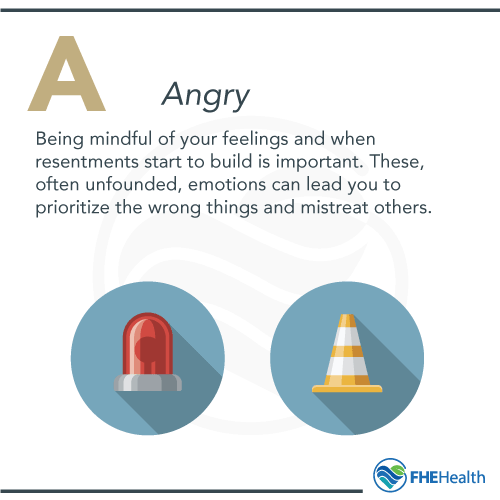 We’ve all experienced it; it’s the drive behind many unfortunate decisions. And many people lack the necessary skills needed to cope with and express this emotion in a constructive way. Anger can lead to resentments we just can’t seem to let go of, name-calling, mean-spirited criticism and physical violence, so it’s a tough one to step away from for long enough to assess how best to proceed.
We’ve all experienced it; it’s the drive behind many unfortunate decisions. And many people lack the necessary skills needed to cope with and express this emotion in a constructive way. Anger can lead to resentments we just can’t seem to let go of, name-calling, mean-spirited criticism and physical violence, so it’s a tough one to step away from for long enough to assess how best to proceed.
Twelve-step programs encourage us to pray for those whom we are angry at or resent, and many have found this to be an effective method of working through those feelings. If you’ve identified what you’re angry about, some physical exertion works wonders to alleviate those out-of-control, nonconstructive reactions. Even a long walk can put things in perspective effectively.
When you’ve identified what you’re angry about and reflected on it, you may find that it is rooted in a feeling of powerlessness or helplessness. Is there a request that you can make of someone and begin to work out a positive solution to the conflict?
Pinpointing the root of your anger is key in dealing with it. Stepping away from a conflict for a timeout, self-reflection or a constructive request can all be effective ways to navigate this emotion. If you can’t find an effective method to work through your anger, seeking help is often the best way forward.
Lonely
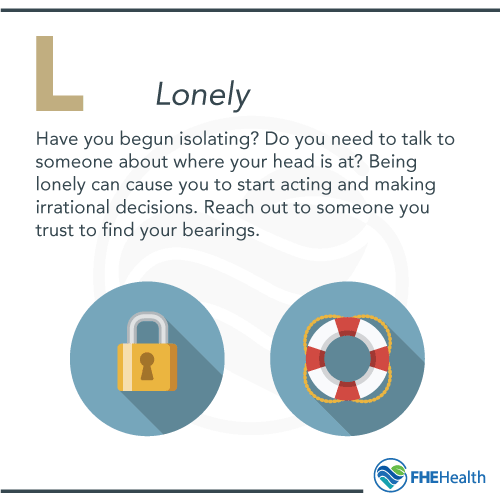 Loneliness, or isolation, can stem from childhood or be caused by depression, among other things. There are many reasons you might be lonely, but the remedy is community, much like the “H” in the H.A.L.T. self-care tool.
Loneliness, or isolation, can stem from childhood or be caused by depression, among other things. There are many reasons you might be lonely, but the remedy is community, much like the “H” in the H.A.L.T. self-care tool.
If you are isolating yourself, you may be at real risk of relapse. You may have serious trouble with reaching out to others, asking for help and trusting others if you are isolating yourself. Spending less and less time with people who know you and your struggles may encourage your inner dialogue to take a detour from your chosen path.
Humans are social creatures, and being without relationships, particularly warm and trusting ones, is detrimental to our overall quality of life and health. Social media has become a regular ritual for many, and it can lead you to feel as though you’re having meaningful engagement with others. But it can’t provide a substitute for face-to-face interactions with those closest to you.
If this is something you’re struggling with, dip your toes in the water and call someone, make a coffee date or go to a park and just watch people. A good chat can do wonders for how you see yourself and the world around you.
Tired
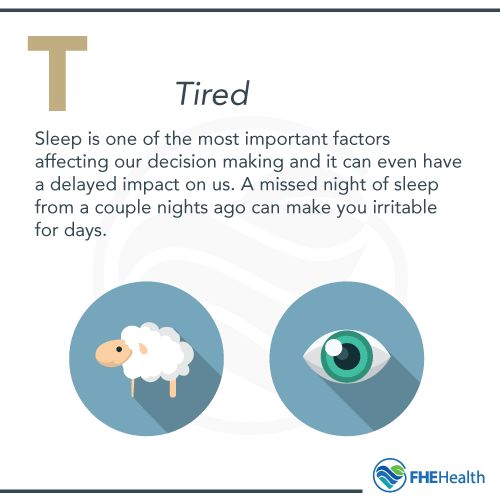 If you aren’t sleeping well, tiredness can have immediate effects through the many moving parts of your life. Things begin to back up like a traffic jam when you’re not capable of paying enough care and attention to the various aspects of your life that need it.
If you aren’t sleeping well, tiredness can have immediate effects through the many moving parts of your life. Things begin to back up like a traffic jam when you’re not capable of paying enough care and attention to the various aspects of your life that need it.
If you need a nap, have one, and if you haven’t been sleeping well for a long time, seek help. Tiredness can really hamper any progress you might be making in your recovery, putting you at risk of relapse.
The rigor of a new lifestyle in sobriety, while very rewarding, can also be very exhausting. A hectic schedule of places to be and things to consider can take a toll. Take a break if it’s all feeling like too much, and see if you can adjust your day’s activities to coincide with your energy levels throughout the day.
The frustration caused by not being able to function reliably because you’re tired isn’t worth the trade-off for supposedly getting more done. Be kind to yourself, and make sure you’re getting enough rest.
H.A.L.T. Addiction
H.A.L.T addiction with these self-care routines. You might find that when you regularly give yourself time to take a step back and reflect on how you’re doing, you may see a big impact on your overall wellness.
Perhaps those daily annoyances that used to frustrate you are fewer and fewer. Keeping these skills top of mind allows you to understand what your needs are and keep your recovery on track.






